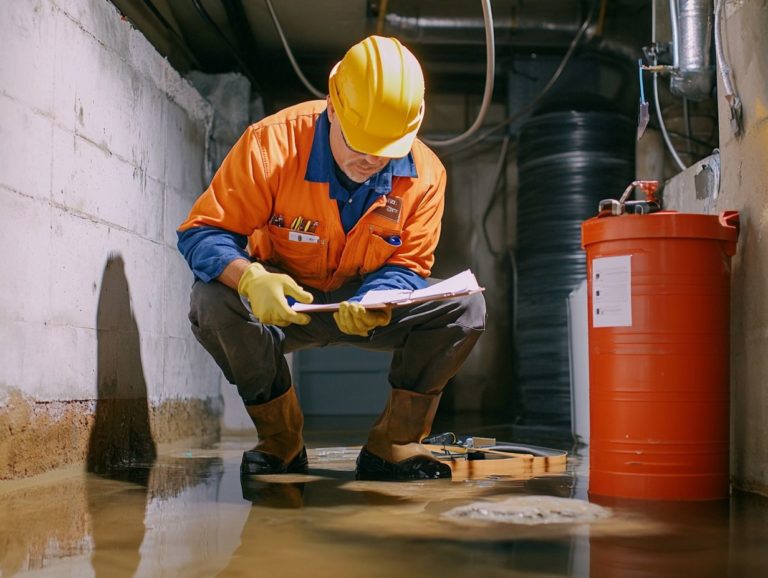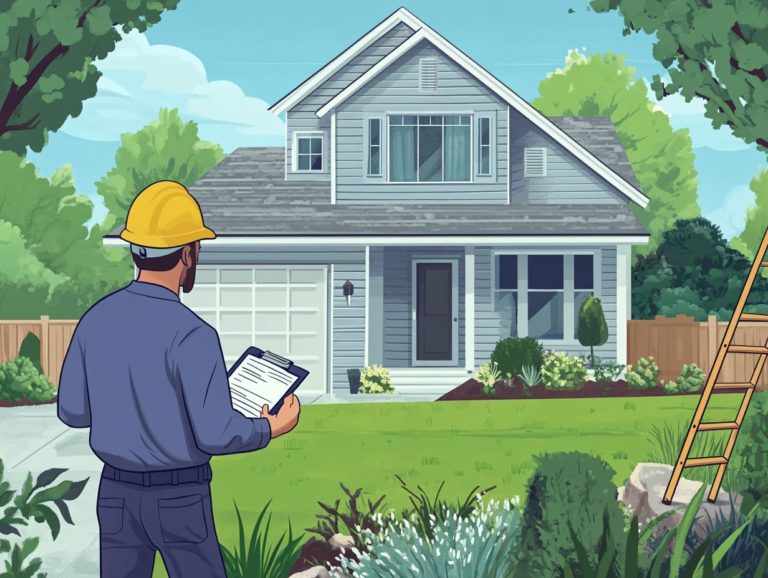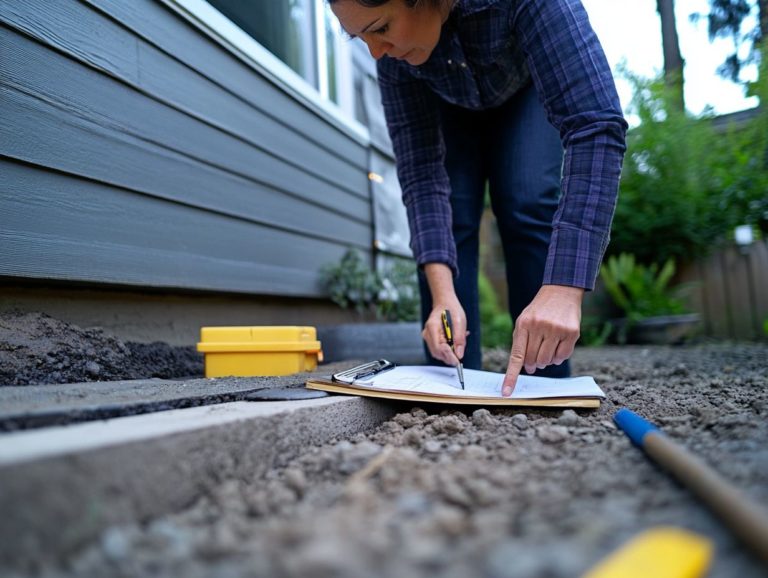How to Prepare for a Home Inspection as a Buyer
Buying a home is an exhilarating journey, yet the process can often feel like a maze, particularly when it comes to ensuring that your potential new residence is in excellent condition.
A home inspection is essential in this adventure, offering you valuable insights into the property’s state and enabling you to make informed decisions. Every detail matters from choosing a qualified inspector to deciphering the inspection report and negotiating repairs.
This article will walk you through the entire home inspection process, arming you with the knowledge you need to navigate this crucial aspect of home buying with confidence.
Contents
Key Takeaways:

Why a Home Inspection Matters
A home inspection is a critical step in your real estate journey, especially if you’re a first-time homebuyer. Knowing how to prepare for a successful home inspection can help ensure a smooth process.
It offers a thorough visual examination of the property’s condition, enabling you to uncover significant defects and hidden issues that might escape your notice at first glance. This inspection gives you the power to make confident choices, negotiate repair costs effectively, and protect your buyer rights, ultimately ensuring a transparent and fair transaction between you and the seller.
Why a Home Inspection is Necessary for Buyers
A home inspection is an essential step for you as a buyer, offering crucial insights into the property’s condition. To ensure you’re ready, you can learn how to prepare for a home inspection. It helps you pinpoint potential repair costs that could spring from unexpected issues like water damage or pest infestations.
At this pivotal stage of the home-buying journey, a comprehensive evaluation reveals current defects while uncovering hidden challenges that could affect your long-term investment.
With these findings in hand, you can craft effective negotiation strategies with sellers, whether that means requesting repairs or seeking price adjustments based on the inspection report. The detailed information from the inspection enables you to make informed purchasing decisions, helping you avoid properties that come with significant risks or repairs that could stretch your budget too thin.
Prioritizing a thorough home inspection can save you time and money, ensuring you secure a sound investment and a worry-free future.
How to Choose a Great Home Inspector
Selecting a qualified home inspector is essential to achieving a successful home inspection. These licensed professionals are instrumental in guiding you through the process, ensuring that residential inspections meet the high industry standards established by organizations such as the American Society of Home Inspectors.
Your choice in inspector significantly influences the quality and reliability of the findings, ultimately impacting your decision-making.
Factors to Consider
When you re evaluating potential home inspectors, there are several critical factors to consider, including their qualifications, relevant experience, and client reviews, which provide valuable insights into their expertise and reliability.
A qualified inspector typically holds certifications from reputable organizations, demonstrating their commitment to the profession and adherence to industry standards. Experience is equally important; seasoned inspectors have encountered a variety of homes and their unique challenges, equipping them to identify potential issues that novices might easily overlook.
The quality of the inspection is directly tied to the inspector’s ability to deliver a thorough, detailed report that highlights not only visible problems but also underlying concerns. Positive client reviews can further underscore their trustworthiness, showcasing a track record of satisfied customers who benefitted from in-depth inspections. Together, these elements form a robust foundation for making an informed choice.
Preparing for the Inspection

Preparing for a home inspection entails a series of essential steps that every discerning homebuyer should undertake. For more information on these steps, check out this guide on how to prepare for a home inspection as a buyer, ensuring a seamless experience.
This includes gathering important documents and crafting a comprehensive home inspection checklist. For detailed guidance, refer to how to prepare for a home inspection and address all necessary arrangements in advance to position yourself for a successful and stress-free inspection process.
Gathering Important Documents and Information
Gathering important documents like the seller disclosure statement and relevant maintenance records is crucial. These documents offer valuable insights into the property’s history and maintenance practices.
For example, the seller disclosure statement outlines known problems or prior repairs. This guides the inspector’s attention to critical areas that may need a closer look.
Records of past inspections and maintenance reveal trends in the property’s condition over time. This allows both the inspector and you, the buyer, to better understand the overall health of the home.
Grasping these details aids in making informed decisions. It also empowers you during negotiations by illuminating the true value and potential concerns associated with the property.
Making Necessary Arrangements
Arrange everything before the inspection to make it more effective. For detailed guidance, check out how to prepare for a home inspection and work with the buyer’s agent to ensure everyone is ready.
Choose a convenient time for the inspection that works for both the buyer and the seller. The buyer’s agent should notify the seller well in advance.
Ensure access to all relevant areas of the property. This may require decluttering spaces or arranging access to locked areas.
By taking these proactive steps, the inspection can proceed smoothly. For detailed advice, check out our guide on how to prepare for a home inspection. This offers a clearer picture of the property’s condition and enables the buyer to make well-informed decisions.
What to Expect During the Inspection
During the home inspection, expect a thorough visual examination of the property. This will include a close look at essential home systems like plumbing, electrical, heating, and cooling systems.
The inspector will also assess the structural integrity of the home. Each critical element will be thoroughly evaluated.
The Inspection Process and Timeline
The inspection process unfolds in a structured timeline, typically spanning 2 to 4 hours. This depends on the size and condition of the property.
It begins with a thorough exterior inspection lasting about 30 minutes. The inspector examines the foundation, roof, and siding for any potential issues.
Afterward, approximately an hour is dedicated to the interior. Key components like plumbing, electrical systems, and heating, ventilation, and air conditioning (HVAC) units are scrutinized to identify any underlying concerns.
Toward the end of the inspection, the inspector shares their findings with you. This dialogue is crucial for making well-informed decisions moving forward.
Allowing ample time for this evaluation underscores the importance of uncovering hidden problems that could impact safety and investment.
Interpreting the Inspection Report

Interpreting the home inspection report is an essential step for you as a buyer. This report consolidates findings and recommendations about the property’s condition, which is why understanding the basics of home inspection for buyers is crucial.
Understanding the report enables you to make informed decisions as you move forward in the purchasing process.
Understanding the Findings and Recommendations
Understanding the findings and recommendations in the inspection report is crucial it can save you thousands! Identifying major defects helps estimate potential repair costs associated with the property.
Decoding these findings demands careful attention to detail. Major defects profoundly impact your decision-making process as a buyer. For instance, structural issues or outdated electrical systems not only present immediate safety concerns but can also lead to significant repair expenses in the future.
Prioritizing these defects is wise, as they often reveal underlying problems that might not be easily observable. Analyzing the inspection report helps you weigh repair costs against the property’s overall value, ensuring you make a well-informed decision that aligns with your financial plans and long-term investment goals.
Negotiating After the Inspection
Negotiating after the home inspection is a pivotal moment for you as a buyer. It s essential to effectively address the issues highlighted in the inspection report and engage with the seller to forge a satisfactory agreement.
This phase can significantly influence your home-buying journey. Handling it well ensures you secure the best possible outcome for your investment.
How to Address Issues and Negotiate with the Seller
Addressing issues highlighted in the inspection report and negotiating with the seller over repair costs is a careful task that demands clear communication and strategic planning.
Start by meticulously reviewing the seller disclosure statement; this document offers essential insights that will guide your discussions. Present specific figures from reputable contractors to support your requests for repair costs.
This approach strengthens your position and conveys your commitment to resolving these matters seriously. Use collaborative language, such as, “We noticed some concerns during the inspection and would like to work together to find a solution that benefits us both.” By fostering an open dialogue and emphasizing the importance of addressing these issues, you significantly increase the likelihood of reaching a mutually advantageous agreement.
Frequently Asked Questions
What is a home inspection and why is it important?

A home inspection is a thorough examination of a property’s condition, including its structure, systems, and components. It is vital for buyers to have a home inspection to identify any potential issues or concerns before finalizing the purchase.
How do I find a reputable home inspector?
There are several ways to find a reputable home inspector, including asking for recommendations from friends or family, checking online reviews, and researching their credentials and experience. Choosing a qualified and certified inspector is important to ensure a thorough and accurate inspection.
What should I expect during a home inspection?
During a home inspection, the inspector will thoroughly examine the property and its components, including the roof, exterior, foundation, plumbing, electrical, HVAC system, and more. They will also take notes and photos to document any potential issues or concerns.
How can I prepare my home for a home inspection?
To prepare your home for a home inspection, ensure it is clean and well-maintained. Clear any clutter and debris from around the exterior and interior. Make sure all utilities are turned on and accessible, and provide any necessary documentation for recent repairs or renovations. Following this guide on preparing for a home inspection as a seller can help streamline the process.
What happens if the home inspection reveals issues?
If the home inspection reveals any issues or concerns, the buyer can negotiate with the seller to have them repaired or addressed before finalizing the purchase. The buyer can also choose to back out of the purchase if the issues are too significant.
Can I attend the home inspection?
Yes, as the buyer, you have the right to attend the home inspection. Being present during the inspection can be helpful to ask questions and see potential issues firsthand. However, it is not required, and you can choose to receive a report and review it with the inspector later. For more insights, consider understanding the importance of a home inspection for buyers.
Ready to start your home inspection journey? Contact us today!






